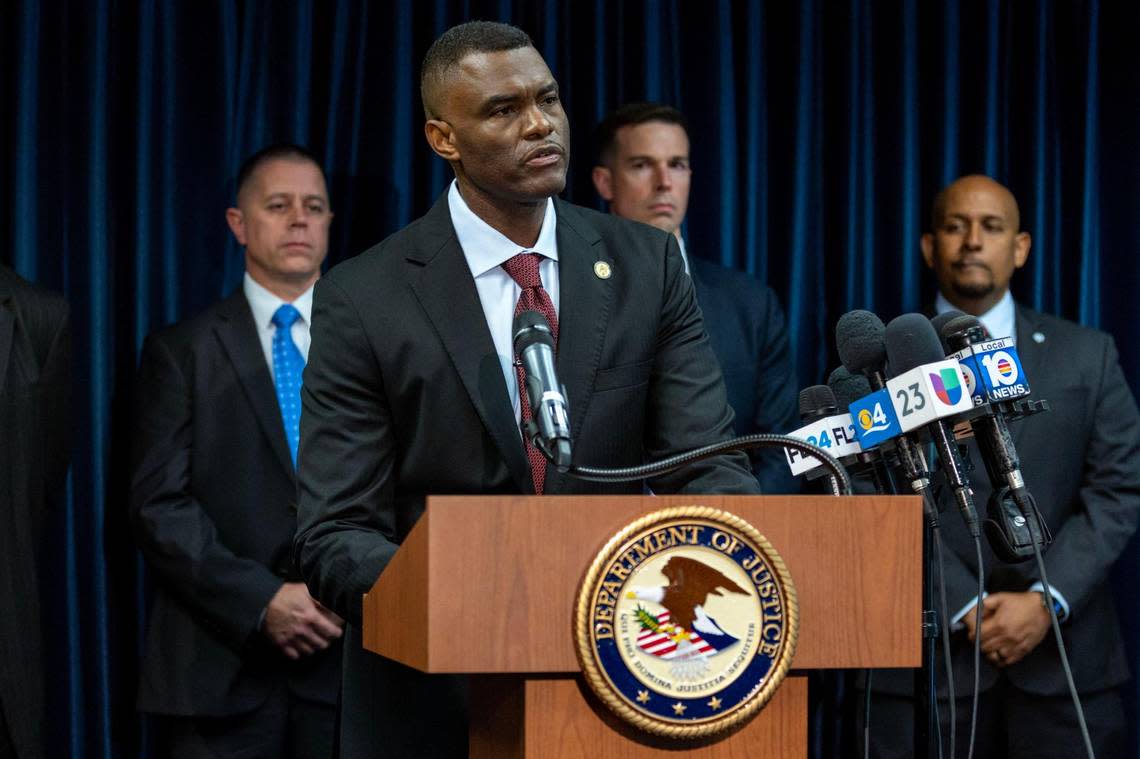Three found guilty of fraud in South Florida nursing-school ‘diploma mill’ trial

Three people charged with playing crucial roles in a South Florida nursing-school “diploma mill” were found guilty by a federal jury Friday, after a three-week trial where prosecutors accused the defendants of corrupting the healthcare field.
The defendants, a former registrar for the defunct Palm Beach School of Nursing and two recruiters from the northeast, were accused of selling fake transcripts and degrees to thousands of students for millions of dollars so they could qualify to attain licenses as nurses.
Prosecutors said that more than 3,500 students paid between $10,000 and $20,000 for bogus academic credentials from the school — after Florida regulators had shut it down in 2018 — so they could sit for licensing exams in New York and gain employment in the healthcare field without proper training. After six hours of deliberations, the 12-member Fort Lauderdale federal jury agreed that the three defendants were at the root of the corruption conspiracy.
The defendants — Gail Russ, 72, the former nursing school registrar; Cassandre Jean, 38, a student recruiter from New York, and Vilaire Duroseau, 58, a recruiter from New Jersey — were convicted of conspiring to commit wire fraud and multiple wire fraud counts that carry up to 20 years in prison. Specifically, the jury found Russ, of Coconut Creek, guilty of 13 wire fraud offenses but not guilty of 5 others; the jury also found Jean, of Wellington and New York, guilty of 4 wire fraud counts and Duroseau guilty of 4 wire fraud counts.
They were the remaining defendants of 14 originally charged in January; 11 pleaded guilty and cooperated with authorities, including several who testified at trial. All were targets of a massive federal crackdown on a nursing-school diploma mill that authorities say was centered in South Florida and extended to the northeast and Texas.
The trio convicted on Friday will be sentenced on April 2 before U.S. District Judge Raag Singhal. The judge allowed them to remain free on bond but required that they pledge their residences as collateral at the request of a prosecutor. Assistant U.S. Attorney Christopher Clark also asked Singhal to require that the three defendants wear electronic monitoring devices while they await sentencing — noting that each faces a “substantial amount of time” in prison — but the judge denied his request.
During closing arguments on Thursday, the prosecution and defense portrayed the threesome implicated in the Palm Beach School of Nursing scandal in a sharply contrasting light.
Assistant U.S. Attorney Jon Juenger told jurors the case represented “the absolute corruption of the nursing field by these defendants and others who worked with them.... This was all a shortcut designed to make money.”
Attorneys for the three defendants countered during closing arguments that they did legitimate work and looked out for the interests of students. The defense tried to raise doubts about the charges by focusing on the government’s star witness: the former owner of Palm Beach School of Nursing, Johanah Napoleon. She had hired Russ as a permanent employee and collaborated with Jean and Duroseau as associates through 2021. Before trial, Napoleon pleaded guilty to a wire fraud conspiracy, was sentenced to 21 months in prison and paid about $3.5 million in financial penalties to the U.S. government.
Napoleon “lies about so many things,” said attorney Grey Tesh, who represented Russ, claiming she was a hard-working, salaried employee who was well liked by her colleagues at Palm Beach School of Nursing.
Napoleon “comes in here and says what she needs to say to keep her family safe,” said lawyer Rod Vereen, who represented Jean, a registered nurse who referred students from New York to the Palm Beach school.
“This lady could sell ice to the Eskimos,” said attorney Martin Beguiristain, who represented Duroseau, a New Jersey educator who once ran a nursing school.
“She has played the government all the way through this,” Beguiristain added, accusing prosecutors of making a sweetheart deal with Napoleon, who may receive even less prison time for her testimony.
Clark, in a rebuttal to the defense, said “there was no fraud perpetrated on the court or the government” by Napoleon.
Clark argued that the defense attorneys were trying to distract jurors by condemning Napoleon as a witness. “The common denominator here is greed — it’s to make money,” Clark reminded the 12 jurors.
At the beginning of this year, prosecutors with the U.S. Attorney’s Office in Miami rattled the healthcare industry and the Haitian-American community when they unveiled a batch of criminal cases charging about 25 defendants who had ownership interests in or worked as employees and recruiters for Palm Beach School of Nursing — as well as other for-profit schools, including Sacred Heart International Institute and Siena College of Health in Broward County. Almost all of those defendants have pleaded guilty.
The network of nursing school operators illegally charged each student between $10,000 for a licensed practical nurse degree and $20,000 for a registered nurse diploma — without requiring proper training, according to federal authorities and court records. The fake diplomas also came with phony transcripts to bolster the “fraudulent” nursing students’ records, federal prosecutors said in court papers.
In doing so, the scofflaw schools provided a shortcut for students to avoid taking a one-year LPN or two-year RN program requiring clinical work, national exams and certification, while instructors coached them on taking the licensing exams to practice nursing in a number of states, prosecutors said.
Many of the students who purchased degrees were from South Florida’s Haitian-American community, including some with legitimate LPN licenses who wanted to become registered nurses, U.S. Attorney Markenzy Lapointe said at a news conference earlier this year. Other students were recruited from out of state to participate in the fraudulent nursing programs.

